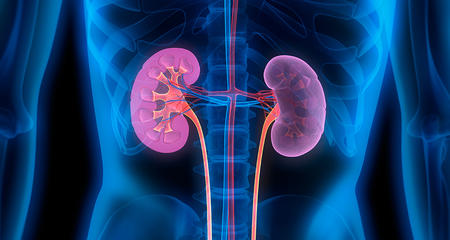Working together with you, we can successfully manage your type 1 or type 2 diabetes through monitoring, medication and lifestyle changes — like diet and exercise. The key to successful self-management is developing a care plan that fits your lifestyle. Our multidisciplinary team helps all our patients to reach their goals.
The Froedtert & MCW Diabetes Care Center is unique in that it offers a continuum of care to all patients, whether you are newly diagnosed or you are experiencing chronic complications of diabetes that emerged over time. In 1988, our program was the first in Wisconsin to receive recognition from the American Diabetes Association for meeting national standards of excellence in diabetes education. Our center offers educational programs and classes to help people with diabetes better understand and manage their disease.
We offer diabetes care at numerous locations. You'll visit with an endocrinology doctor or clinician alongside certified diabetes educators (nurses and dietitians) for ongoing management of your condition. In addition to teaching diabetes self-management, the clinics offer expertise on all available medications and the latest diabetes technologies including:
- Insulin pumps
- Continuous glucose monitors
- Smart insulin pens
- Blood glucose meter downloads
- On-site rapid A1c measurement
Our multidisciplinary team works together with your primary care provider to improve blood sugar control, reduce diabetes management burden and get back to doing things you most enjoy.
If you have other health problems associated with diabetes, you require specialized care. When your condition requires, other Froedtert & MCW specialists — ophthalmologists, cardiologists, neurologists, vascular physicians or other specialists — are all located in the same health system, at many convenient locations, facilitating easier coordination of patient treatment plans.
On-Site, Rapid Hemoglobin A1c Measurement
Hemoglobin A1c (A1c) measurements are very helpful for monitoring blood sugar control in patients with diabetes. Rapid A1c testing (results ready in 6 minutes) in the diabetes clinic provides more efficient patient care and improved diabetes management. An A1c test measures the amount of glycated hemoglobin in the blood. Glycated hemoglobin is a substance formed in red blood cells when blood sugar attaches to hemoglobin. This test provides a measure of your average blood sugar control over the past few months. Higher A1c values lead to higher risk of developing complications such as eye disease, heart disease, kidney disease, nerve damage and stroke.
Diabetes Medications
Recently, there has been a dramatic and exciting increase in available therapies for the treatment of type 1 and type 2 diabetes. This has enabled patients to personalize their diabetes treatment plans based on their goals and lifestyle. We now have medications that help us to control blood sugar levels and help reduce the risk of complications from diabetes like kidney disease, heart attacks, stroke and heart failure.
Froedtert & MCW endocrinologists are experts in the use of all available diabetes medications. We will help you choose the best treatment plan that fits your individual lifestyle to helping you maximize quality of life and achieve your health goals so you can get back to the things that matter most.
Continuous Glucose Monitoring
Continuous glucose monitors (CGMs) are FDA-approved devices that record sugar levels 24-hours a day. CGM is used to determine trends in glucose levels to help your healthcare team make appropriate decisions for your treatment plan. It can help identify patterns that would otherwise go unnoticed with standard tests and/or finger stick measurements.
A tiny glucose-sensing device (sensor) is placed and worn by patients on various areas of the body with a small catheter inserted just underneath the skin. The sensor measures the level of glucose in the tissue fluid (correlates to blood glucose levels in real time) and sends the information to a monitoring device or your phone using an app. The system records and displays glucose values in real time. Sensors are worn for 10-14 days and can be repeatedly exposed to water before they need to be changed. You can record any insulin taken, exercise, activities and food consumed in your monitor for review. Alarms can be set and adjusted to warn you of high or low blood sugars before levels become dangerous.
Our nurses are available to assist anyone using a CGM for the first time to provide reassurance, assistance with placement and ongoing education. All glucose information is saved by the device and reports can be generated to help your provider identify problematic glucose patterns and areas for improvement at your clinic appointment. Your diabetes team can review the collected data (both in person and remotely) and make any necessary treatment adjustments to your diabetes management plan.
Insulin Pump Program
Some patients with diabetes may be candidates for an insulin pump, a device that delivers rapid, short-acting insulin continuously through a catheter placed underneath the skin. The pump provides an alternative to multiple daily injections of insulin and can help keep blood glucose levels within target ranges while reducing the burden of managing diabetes.
Our providers and nurses are experts in all currently available insulin pump systems, including insulin pumps that are integrated with continuous glucose monitors. We also strive to become experts in new technologies as soon as they become available to patients.
Once you meet criteria for a pump, nurses who specialize in insulin pump therapy and continuous glucose monitors work with you to ensure your comfort with the pump of your choice. We teach you how to place and change your pump properly, operate your pump and troubleshoot problems. We are with you every step of the way.
Inpatient Diabetes Management
Multidisciplinary diabetes teams are dedicated to improving blood sugar control of patients in the hospital. Comprehensive diabetes management and education are provided to all patients admitted to our hospitals. Our diabetes experts are dedicated to targeting appropriate blood sugar control during hospitalization, regardless of the severity of the patient’s condition.
Three dedicated teams meet the special needs of hospitalized patients with diabetes:
- Diabetes Management Team (DMT): Consists of an endocrinology physician, nurse practitioners, and physician assistants who provide direct patient care and blood glucose monitoring.
- Certified Diabetes Care and Education Specialist (CDCES): Teach patients diabetes self-management tools during time in the hospital.
- Diabetes Assessments and Resource Team (DAART): Provides surveillance and feedback to the DMT for hospitalized patients who take insulin. These patients are at higher risk for complications when hospitalized. This proactive approach, in use hospital-wide, has yielded significantly better management of patients on insulin.
Care for Complications
Froedtert & MCW doctors are highly experienced in treating patients with complications of diabetes taking advantage of our wide range of subspecialists taking a multidisciplinary approach to a variety of complications, including:
- Microvascular complications
- Diabetic retinopathy
- Peripheral neuropathy
- Diabetic foot ulceration
- Charcot joint
- Diabetic nephropathy
- Microalbuminuria
- Proteinuria
- Chronic kidney disease
Recognized as High Performing by U.S. News & World Report
Froedtert Hospital is recognized as high performing by U.S. News & World Report in three adult specialties and 16 procedures and conditions, including diabetes care.More to Explore





